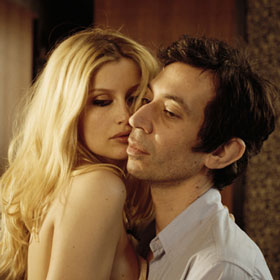Gainsbourg: A Heroic Life

3.5/5
There are controversies and then there are controversialists, people who excel at getting under our skin, who make it their life to expose the dirty bits and cause uproar whether seriously or for fun. Serge Gainsbourg certainly did it for fun. The sly, erotic troubadour, with his tipsy grin and impossibly smooth voice, had enough panache to inspire and anger a whole country.
During the post-war years in France, Gainsbourg rose to an unequaled height of popularity and scandal. His duet with Jane Birken, “Je T’aime,” evoked the official disapproval of the Vatican, and his reggae rendition of the French national anthem was enough to illicit death threats. The list goes on: a thinly veiled song about oral sex written for an underage teen pop star, an infamous talk show appearance alongside Whitney Houston where he spoke plainly about his desire for the diva, etc. etc. Without a doubt Serge Gainsbourg lived his life as vividly as possible, regardless of typecasting and censorship, and cemented himself as possibly the most influential pop artist ever and certainly as a national hero to the people of France.
So it should be no surprise that such a life presents excellent material for a movie. After several efforts to create a film biopic of the enigmatic Gainsbourg, only one has been able to garner the approval of his family and see daylight. Serge Gainsbourg: A Heroic Life opens with the young Gainsbourg (born Lucien Ginsburg) being rejected in his earliest romantic effort, then casually lighting a cigarette. As if this was the catalyst, we see his defiant and sardonic personality develop from a child who tries to seduce women more than twice his age, into a skinny and misty-eyed painter (Eric Elmosnino as a dead ringer) who makes his money playing piano bars, until he ultimately becomes an undisputed musical icon.
The movie trails Gainsbourg’s career, briefly lighting on his affair with Bridgette Bardot (Laetitia Casta), his crumbling relationship with Jane Birken (the late Lucy Gordon) and his health problems. We see fleeting moments of Gainsbourg composing the songs we remember most: a tender scene between him and Bardot practicing “Bonnie and Clyde” and his hilariously creepy smile while he watches France Gall try out “Les Sucettes.” And yet the only song that is heard, as recorded, is “Je T’aime.”
Perhaps the biggest problem with Serge Gainsbourg: A Heroic Life is that writer/director Joann Sfar (the movie an adaptation of his graphic novel) subjects the film to near-strict linear fashion, and a narrative so brisk that events seem to blur into each other. We see Gainsbourg leaving his second wife, and yet don’t remember him getting married. The affair with Bardot, which was impactful enough to spark the album Initials BB, is given only a handful of scenes and ends as quickly as it began.
We hardly see Gainsbourg recovering from the affair before he hooks up with Birkin. Granted the real-life span between these two events was merely a couple of years, it seems that the purpose of a biopic is to unpack, not condense. From here on, the milestones in Gainsbourg’s life appear to sneak up on the audience. Similarly, his rise to fame in the film is so unnoticeable one might forget that there was a time Gainsbourg wasn’t a household name in France.
Really, the most engaging part of the movie, plot-wise, happens at the beginning. The childish Gainsbourg is funny and sophisticated, claiming himself wise beyond his years and chain-smoking cigarettes with abandon. He shows up early to receive his yellow star from the Nazis and paints lewd pictures for his classmates (and teacher). Here too is all the wonder we expect from such a luminescent figure. We see the young Gainsbourg dancing with a cruel caricature straight off a Nazi propaganda poster, and watercolors, charmingly drawn from Gainsbourg’s own imagination coming to life.
By far it’s the surrealist aspects – the puppetry and animation – which are the most inventive and successful moments in the film. Sfar is at his best when working with the graphic medium, his images alternately dreamy and nightmarish, filled with child-like awe but with lucidity beyond innocence. Unfortunately, this approach isn’t consistent. Gainsbourg’s alter ego, a frightening version of himself with exaggerated nose and ears, makes appearances throughout the film reminding – or pushing – the audience to acknowledge the movie’s attempts at freshness, which feel deliberate and obvious.
Despite the brisk pacing, Serge Gainsbourg: A Heroic Life is visually ambitious and daring in scope. At times the movie feels like a love letter to the decades’ varied aesthetics, while still trying to contain such a multifarious life such as Gainsbourg’s. This is precisely the biggest hurdle the movie faces – how to tell the story of a man whose music defied genres and whose life was equally resistance to categorization, and still manage to cram it all into two hours?
Whatever the possibilities of such a story, we might never know. It’s possible that A Heroic Life may be the only movie made about Gainsbourg. His family is closely guarded, respectful of his secrets. But it’s exactly these secrets that we all crave, although not knowing is part of the mystique and the intrigue behind the man. Surely, Serge wouldn’t have had it any other way.
RELATED ARTICLES
Get the most-revealing celebrity conversations with the uInterview podcast!





Leave a comment